|
|
|
Sort Order |
|
|
|
Items / Page
|
|
|
|
|
|
|
| Srl | Item |
| 1 |
ID:
134675


|
|
|
|
|
| Summary/Abstract |
The centenary of the outbreak of the First World War has so far produced a great deal of attention from scholars, history buffs, and policymakers alike. Much of this attention says more about attitudes in 2014 than the actual events of 1914. This essay explores ways to use—and not use—analogies to 1914 in discussing present-day policy problems. It demolishes some traditional ways of viewing 1914 and focuses on the unusual and unexpected set of circumstances in that fateful summer. The article concludes by discussing some of the dangers inherent in simplifying history and looks closely at the ways that historians tend to use the past to develop insights for the present.
|
|
|
|
|
|
|
|
|
|
|
|
|
|
|
|
| 2 |
ID:
136459


|
|
|
|
|
| Summary/Abstract |
When Britain entered the First World War it did so as an especially hesitant belligerent. One month later, the British enthusiastically signed the Treaty of London, stating that the Entente powers would prosecute the war in common and that none would pursue a separate peace. Why would a state long known for jealously guarding its ability to maintain a free hand initiate a binding alliance that restricted its war termination prospects after one month of combat? And what were the effects of its decision to do so? Answering this question requires not only that we examine British decision making but that we understand No Separate Peace Agreements and why states sign them. I hypothesize that a state will initiate a No Separate Peace Agreement when it has reason to fear that one of its cobelligerents may defect. I also hypothesize that No Separate Peace Agreements will cause states to reconcile war aims with their allies, agreeing to different terms of peace than might have been necessary to satisfy any one of them individually. Using new archival documents, I analyze a case study of British decision making in the early weeks of World War I and find substantial support for the hypotheses.
|
|
|
|
|
|
|
|
|
|
|
|
|
|
|
|
| 3 |
ID:
135819


|
|
|
|
|
| Summary/Abstract |
The task of coming to a proper appreciation of Clausewitz’s thoughts on war is to combine a hierarchical structure with that of a floating balance. This article examines the relation of purpose, aims and means in Clausewitz’s theory and highlights that this relation is methodologically comparable to the floating balance of Clausewitz’s trinity. Modern strategic thinking is characterised by the ‘ends, ways, means relationship’ and the concept of the ‘way’ as shortest possible direct connection between ends and means. If strategy is nothing else than the direct way of linking the political purpose with the means, understood as combat, this understandings results in ‘battle-centric’ warfare. My thesis is that the aim (goal, way) in warfare is not a direct link between purpose and means, but rather an indirect, intermediary dimension, a mediation (in Hegelian terms) between purpose and aims with its own grammar. This article distinguishes (sometimes going beyond Clausewitz) between the rationality of the whole process of war, the rationality of the separate aspects of purpose, aims and means in warfare and finally their conflicting tendencies. This article highlights Clausewitz’s different concepts of purpose and aims and tries to shed at least some light of the strategic implications of this difference. This interpretation of Clausewitz leads to the definition of strategy as maintaining a floating balance of purpose, aims and means in warfare.
|
|
|
|
|
|
|
|
|
|
|
|
|
|
|
|
| 4 |
ID:
135339


|
|
|
|
|
| Summary/Abstract |
Anarchy was coming to Africa, Robert Kaplan warned in 1994, and a surge in conflict initially seemed to confirm that prediction. With less fanfare, however, after the year 2000, conflict in Africa declined, probably to the lowest levels ever. Recent fighting in Libya, Mali, South Sudan and elsewhere has prompted a new wave of ‘Africa falling apart’ concerns. This article reviews the history and data of conflict in Africa, from pre-colonial times to the present. Historical comparison and quantitative analysis based on the Uppsala Conflict Data Program (UCDP) and Major Episodes of Political Violence (MEPV) datasets on the 1961–2013 period show that Africa has experienced a remarkable decline in warfare, whether measured in number of conflicts or fatalities. Warfare is a relatively low risk to the lives of most Africans. The years 2010–2013 saw an increase of 35 per cent in African battle deaths over 2005–2010, but they still are 87 per cent lower than the 1990–1999 average. Changes in external support and intervention, and the spread of global norms regarding armed conflict, have been most decisive in reducing the levels of warfare in the continent. Consequently, there is no Africa exception to the systemic shift towards lower levels of armed conflict.
|
|
|
|
|
|
|
|
|
|
|
|
|
|
|
|
| 5 |
ID:
137073


|
|
|
|
|
| Summary/Abstract |
This paper is a cautiously sympathetic treatment of conspiracy theory in Pakistan, relating it to Marxist theories of the state, structural functionalism and Machiavellian realism in international relations. Unlike moralising mainstream news reports describing terrorism in terms of horrific events and academic research endlessly lamenting the ‘failure’, ‘weakness’ and mendacity of the Pakistani state, conspiracy theory has much in common with realism in its cynical disregard for stated intentions and insistence on the primacy of inter-state rivalry. It contains a theory of the postcolonial state as part of a wider international system based on class-conspiracy, wedding imperial interests to those of an indigenous elite, with little concern for preserving liberal norms of statehood. Hence we consider some forms of conspiracy theory a layperson’s theory of the capitalist state, which seeks to explain history with reference to global and domestic material forces, interests and structures shaping outcomes, irrespective of political actors’ stated intentions. While this approach may be problematic in its disregard for intentionality and ideology, its suspicion of the notion that the ‘War on Terror’ should be read morally as a battle between states and ‘non-state actors’ is understandable – especially when technological and political-economic changes have made the importance of impersonal economic forces driving towards permanent war more relevant than ever.
|
|
|
|
|
|
|
|
|
|
|
|
|
|
|
|
| 6 |
ID:
134234


|
|
|
|
|
| Summary/Abstract |
On a single day in July, when ambient tensions escalated, Palestinian militants fired more than 180 rockets into Israel, and the Israelis launched airstrikes against towns throughout the Gaza Strip. Dozens of Palestinians, most of them civilians, were killed. The order of daily urban life was disrupted, yet again, by warfare.
|
|
|
|
|
|
|
|
|
|
|
|
|
|
|
|
| 7 |
ID:
136776


|
|
|
|
|
| Summary/Abstract |
The nature of warfare has undergone a major change over the last few decades, brought about by rapid advancement in technologies combined with changes in doctrines and organisational concepts. This has resulted in enhanced focus on integrated and joint operations. Unified structures have been put in place by all major militaries in the world to optimise their defence capabilities. India appears to be reluctant to adapt wholeheartedly to the changing nature of war-fighting despite facing a wide variety of threats to its internal and external security. This article makes a case for establishing unified commands in India to enhance integration and jointness at the strategic and operational levels. In doing so, it examines various available models for implementation in the Indian context. Finally, it suggests a viable model for unified commands for India keeping in mind the geo-political realm and the external and internal threats to its security.
|
|
|
|
|
|
|
|
|
|
|
|
|
|
|
|
| 8 |
ID:
136306


|
|
|
|
|
| Summary/Abstract |
Airplanes were part of technological advance that rendered traditional forms of warfare obsolete. The war began with pilots shooting pistols and ended with planes equipped with machine guns and bombs. The article “The Evolution of Aviation in Times of War and Peace,” by Sarah Jane Cox, takes a look at the dynamic relationship between the evolution of aviation and society, for purposes of both peace and war. This year marks the 70th anniversary of the Convention on International Civil Aviation in Chicago, born out of the ashes of WWI, which began 100 years ago. Since that convention was signed, globalization has increasingly developed, and the airplane has played a significant role in this. However, regulations have not kept apace with either social or technological changes. The concept of absolute state sovereignty does not have the power it did 70 years ago, as many social institutions have become global. Aviation is one of those instituions. She makes a case to revisit and update international aviation conventions in ways that serve the cause of peace and human happiness.
|
|
|
|
|
|
|
|
|
|
|
|
|
|
|
|
| 9 |
ID:
135581
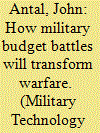

|
|
|
|
|
| Summary/Abstract |
In the 21st century a modernized military force and waging war is expensive. As wars engulf the Middle East, Africa and the Ukraine – to mentions a few hotspots- military budgets in the US and many other nations are slashed as their economies can no longer sustain previously high expensive levels. something but, what? How? has to change.
|
|
|
|
|
|
|
|
|
|
|
|
|
|
|
|
| 10 |
ID:
135371


|
|
|
|
|
| Summary/Abstract |
In May 2009, Lieutenant Mark Evison, of the 1st Battalion Welsh Guards, was shot in the shoulder during an ambush on his platoon while on patrol in the Nad-e Ali district of Helmand Province, Afghanistan. Three days later, having first been flown to Camp Bastion for emergency surgery and then to the UK for further treatment, he was declared brain dead and his family switched off his life-support machines. In this article, Lieutenant Evison's mother provides a very personal reflection on the extremely difficult period following his death, recalling her impressions of the support provided to the platoon members, and the legal process that followed in the form of the coroner's inquest.
|
|
|
|
|
|
|
|
|
|
|
|
|
|
|
|
| 11 |
ID:
134277


|
|
|
|
|
| Summary/Abstract |
On 6 November 1990, nearly 50 Saudi women staged a protest against the ban on women operating motor vehicles in Saudi Arabia. Occurring in the midst of the First Gulf War, the women's protest was a political statement about the harsh restrictions placed on women in the Middle Eastern country which both reflected and influenced Saudi society’s encounter with their American allies during the war. When United States (US) military personnel flooded into Saudi Arabia during the war, they were shocked at the way American servicewomen were treated by their Saudi allies and the second-class status of Saudi women throughout the country. This article explores Americans' reactions to their encounter with Saudi gender relations during the war and argues that the poor treatment of women in Saudi Arabia—which Americans dubbed ‘gender apartheid’—caused many Americans to question the longstanding US alliance with the conservative Muslim country. In doing so, US journalists, military personnel, scholars and the general public began to demand that concern about women's rights should be integrated seriously into US foreign policy towards the Muslim world.
|
|
|
|
|
|
|
|
|
|
|
|
|
|
|
|
| 12 |
ID:
135935


|
|
|
|
|
| Summary/Abstract |
With Japan viewing Southeast Asia as its natural sphere of influence and a region of immense economic complementarities and potential, it was no surprise that Japan moved quickly in the post-war period to shore up and rebuild its influence in this strategically vital region as the European colonial powers departed from Southeast Asia. Using reparations, followed by aid and trade, Japan soon became a key economic and strategic state actor in Southeast Asia.
Providing a valid counterpoint to communism, Japan proved an attractive economic model that enabled it to grow its influence in the region substantially. Using deft and low-profile diplomacy Japan became an economic leader and driver of economic growth and prosperity in Southeast Asia, supplementing and supporting US Cold War regional objectives. During times of conflict, Japan worked to reduce tensions and restore order using its unique brand of Asian diplomacy, not losing sight of its long-term goal of integrating the region economically and fostering regional peace and stability.
|
|
|
|
|
|
|
|
|
|
|
|
|
|
|
|
| 13 |
ID:
135512


|
|
|
|
|
| Summary/Abstract |
Treating the information dominance corps as a general warfare competency risk weakening the skill sets of its specialists.
|
|
|
|
|
|
|
|
|
|
|
|
|
|
|
|
| 14 |
ID:
134688


|
|
|
|
|
| Summary/Abstract |
In the closing months of 1994, the principal paramilitary organizations in Northern Ireland declared that their campaigns of violence were at an end. The cease-fires called by republican and loyalist groupings represented the most significant heralds of a complex process of conflict transformation that continues to unfold even twenty years on. In this introduction, we set out to map the key developments that have shaped the tortuous narrative of the Northern Irish ‘peace process’, thereby providing the historical backdrop for the articles that follow. While remarkable progress has been made over the two decades since the paramilitary cease-fires, the political context and future of the region remain rather more fraught than is often assumed abroad. It is perhaps best, then, to speak of the six counties in terms not of resolution but rather of ambiguity. Twenty years on from the optimism that greeted the paramilitary cease-fires, Northern Ireland retains the essential ‘inbetweenness’ of a political space that has moved from a ‘long war’ through a ‘long peace’ and into a profoundly undecided future.
|
|
|
|
|
|
|
|
|
|
|
|
|
|
|
|
| 15 |
ID:
134652
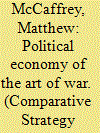

|
|
|
|
|
| Summary/Abstract |
Sun Tzu's The Art of War deals with the economic aspects of military operations as well as some more general economic principles. This article studies several of its economic ideas in turn: on war and the state, the effect of war on economic affairs, and the role of incentives in promoting desired behavior within military organizations. It also discusses how the text treats ideal military strategy as a matter of opportunity discovery, analogous to entrepreneurship in the work of Israel Kirzner.
|
|
|
|
|
|
|
|
|
|
|
|
|
|
|
|
| 16 |
ID:
136592


|
|
|
|
|
| Summary/Abstract |
At the end of the fifty-day Israeli offensive on the Gaza Strip, neither Israel nor Hamas had achieved their stated goals there: the armed resistance was still standing (despite the massive damage the territory and its people sustained) and the crippling Israeli siege was not lifted. Rather, this essay argues, it was Israel’s far right that emerged the victor. Not only did religious nationalists and secular extremists outflank the right-wing establishment, they justified the brutality of their actions in the military battle zone with messianic pronouncements, and fanned the flames of genocide in the public arena. The far right’s wartime success represented the culmination of a strategy Israeli sociologist Baruch Kimmerling has called “politicide,” a coinage denoting the partial or total destruction of a community of people with a view to denying them self-determination.
|
|
|
|
|
|
|
|
|
|
|
|
|
|
|
|
| 17 |
ID:
137013


|
|
|
|
|
| Summary/Abstract |
This article traces the rise of military psychological resilience training, focusing on the US Army’s Comprehensive Soldier and Family Fitness program, which seeks to assess and instill resilience in soldiers and their families through techniques developed in the discipline of positive psychology. In maximizing the happiness, optimism, and mental fitness of soldiers, military resilience training has two aims: (1) to produce a fit fighting force capable of winning complex wars, and (2) to cut costs, not by averting war, but by ostensibly reducing the need for costly healthcare through a claim to prevent soldiers’ ‘pessimistic’ responses to war. The architects of military resilience are also exporting this model to the civilian sphere of social security, using their military experiment as ‘proof of concept’ of the scientific validity not only of resilience training, but also of positive psychology more generally. The article thus illustrates that ‘social security’ cannot be held separate from inter/national security, because these domains are, in practice, imbricated. It is argued that resilience is not merely a response to war and austerity, but a means for producing these forms of precarity through a fantasy of indomitability. The article concludes by considering the broader ethics of psychological resilience.
|
|
|
|
|
|
|
|
|
|
|
|
|
|
|
|
| 18 |
ID:
136716
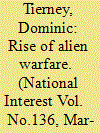

|
|
|
|
|
| Summary/Abstract |
From the War of 1812 to today’s campaigns in the Middle East, both Washington’s enemies and the local populations have become steadily less familiar in terms of language, religion and social traditions.
|
|
|
|
|
|
|
|
|
|
|
|
|
|
|
|
| 19 |
ID:
134474
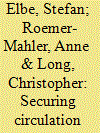

|
|
|
|
|
| Summary/Abstract |
Governments in Europe and around the world amassed vast pharmaceutical stockpiles in anticipation of a potentially catastrophic influenza pandemic. Yet the comparatively ‘mild’ course of the 2009 H1N1 pandemic provoked considerable public controversy around those stockpiles, leading to questions about their cost–benefit profile and the commercial interests allegedly shaping their creation, as well as around their scientific evidence base. So, how did governments come to view pharmaceutical stockpiling as such an indispensable element of pandemic preparedness planning? What are the underlying security rationalities that rapidly rendered antivirals such a desirable option for government planners? Drawing upon an in-depth reading of Foucault’s notion of a ‘crisis of circulation’, this article argues that the rise of pharmaceutical stockpiling across Europe is integral to a governmental rationality of political rule that continuously seeks to anticipate myriad circulatory threats to the welfare of populations – including to their overall levels of health. Novel antiviral medications such as Tamiflu are such an attractive policy option because they could enable governments to rapidly modulate dangerous levels of (viral) circulation during a pandemic, albeit without disrupting all the other circulatory systems crucial for maintaining population welfare. Antiviral stockpiles, in other words, promise nothing less than a pharmaceutical securing of circulation itself.
|
|
|
|
|
|
|
|
|
|
|
|
|
|
|
|
| 20 |
ID:
135969
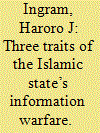

|
|
|
|
|
| Summary/Abstract |
If the West is to defeat the self-proclaimed Islamic State, it must understand the reasons for the success of the group’s information warfare. The success of the Islamic State throughout the ‘fertile crescent’ is a striking example of a modern insurgency, and information operations have played a central role in the group's strategy. Drawing on primary sources, Haroro J Ingram analyses three traits of the Islamic State's information warfare: the use of a multidimensional, multi-platform approach that simultaneously targets ‘friends and foes’ to enhance the reach, relevance and resonance of its messaging; the synchronisation of narrative and action to maximise operational and strategic ‘effects’ in the field; and the centrality of the Islamic State ‘brand’ to its entire campaign.
|
|
|
|
|
|
|
|
|
|
|
|
|
|
|
|
|
|
|
|
|